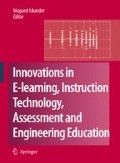Online learning requires learning material to be made available in a suitable manner over a network. Content Management System (CMS) [1] helps in making the learning materials organized and accessible in some intelligent fashion online. Content creation for a CMS requires two roles of people, teacher and content developer. Content developer interacts with teacher for getting content. Content developer then formats and places content into a CMS. This interaction between teacher and content developer is manual and depends on their personal experience.
Pedagogy-oriented Content Markup Language (PCML) is an effort to automate this interaction between teacher and content developer. PCML defines a set of tags, for tagging content, based on the pedagogic role of a particular part of content. Content developer can then use this tagged content (developed by teacher) to develop contents for a specific Content Management System. It also addresses many other issues in content development like reusability, personalization and minimal loss of information.
Access this chapter
Tax calculation will be finalised at checkout
Purchases are for personal use only
Preview
Unable to display preview. Download preview PDF.
Refrences
RFC-0001: Content Management System, http://www.xaraya.com/documentation/rfcs/rfc0001.html, The Digital Development Foundation ,2002.
T Rishi, A Dharma P., Tracing the roots of markup languages,Communications of the ACM: Vol. 47, No. 5, May 2004.
M Sean, XML by Example: Building E-Commerce Applications, 1st Ed., Ptr Prentice Hall, 2000.
Mathematical Markup Language (MathML), http://www.w3.org/TR/MathML2/, Ver. 2.0 2nd Ed., W3C Recommendation, 2003.
Introduction to NewsML, http://www.newsml.org/pages/intro_main.php, IPTC, International Press Telecommunications Council, 2006
RuleML, http://www.ruleml.org/, The Rule Markup Initiative,2006
Anjni Koul, Bharati Sarkar,B.K. Sharma, B.K. Tripathi, Brahm Parkash, Dinesh Kumar, K.B. Gupta, Krishna Lal,R.D. Shukla, R. Joshi,V.B. Bhatia Vinod Kumar,V.S. Bhasin, Science and Technology: Textbook for Class X, National Council of Educational Research and Training, 2003.
Drupal, http://drupal.org/node, 2000-2007
Philip S Tellis, Prem Sreenivasan Narayan, Suresh Dhamapurkar, Sasikumar M, SP Mudur, Vasistha - An Instruction Delivery Framework for Online Learning, National Centre for Software Technology, 2001
Author information
Authors and Affiliations
Editor information
Editors and Affiliations
Rights and permissions
Copyright information
© 2007 Springer
About this paper
Cite this paper
Kumar, A., Sasikumar, M. (2007). PCML: A Pedagogy-oriented Content Markup Language. In: Iskander, M. (eds) Innovations in E-learning, Instruction Technology, Assessment, and Engineering Education. Springer, Dordrecht. https://doi.org/10.1007/978-1-4020-6262-9_3
Download citation
DOI: https://doi.org/10.1007/978-1-4020-6262-9_3
Publisher Name: Springer, Dordrecht
Print ISBN: 978-1-4020-6261-2
Online ISBN: 978-1-4020-6262-9
eBook Packages: EngineeringEngineering (R0)

